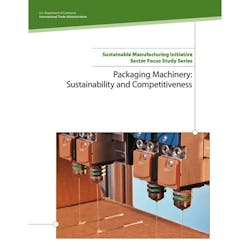Sustainability: A smart strategy for U.S. packaging machinery makers
Nov. 22, 2010
2 min read
U.S. manufacturers of packaging machinery can compete successfully in both domestic and international markets by pursuing business strategies based on sustainability. That is the conclusion drawn from a new report issued by the U.S. Department of Commerce’s International Trade Administration, "Packaging Machinery: Sustainability and Competitiveness." The report is part of a series created to inform public- and private-sector stakeholders about the specific sustainability-related challenges, present-day best practices, and unrealized opportunities that exist in specific U.S. manufacturing sectors."Packaging is essential infrastructure for our modern manufacturing economy—many business operations would be impossible without it," says Peter Perez, ITA’s deputy assistant secretary for manufacturing. “Packaging machinery manufacturers provide crucial technology for a large and increasingly globalized packaging supply chain.”The global market for packaging equipment is estimated to be nearly $25 billion. The sustainable strategies identified in the report are said to enable U.S. packaging machinery OEMs to target the largest cost per value component of the global packaging market: packaging materials, which are worth an estimated $475 billion annually.Among the principal findings of the study are the following:• Packaging machinery OEMs operate in a global packaging supply chain that faces increasing demands for sustainability.• Retailers, in particular, play a key role in driving demand for more sustainable packaging throughout the entire supply chain, even though they generally are not end users of packaging machinery.• Reducing customers’ consumption of packaging materials and ancillary products is the common objective of packaging machinery OEMs that have incorporated sustainability into their core business strategy.• Reducing customers’ packaging-related consumption of energy and water, and their emissions of greenhouse gases are also key components of successful sustainability strategies.• The lack of definitions, certifications, or standards for sustainability in packaging machinery appears to contribute to the lack of demand.• European laws, regulations, and standards concerning packaging and machinery are shaping the world market.Also included in the report are five case studies describing innovative OEMs—Delkor Systems, Hartness, Nordson, Partner Pak, and Pro Mach—and their sustainability strategies.
About the Author
Sign up for our eNewsletters
Get the latest news and updates

Leaders relevant to this article:
